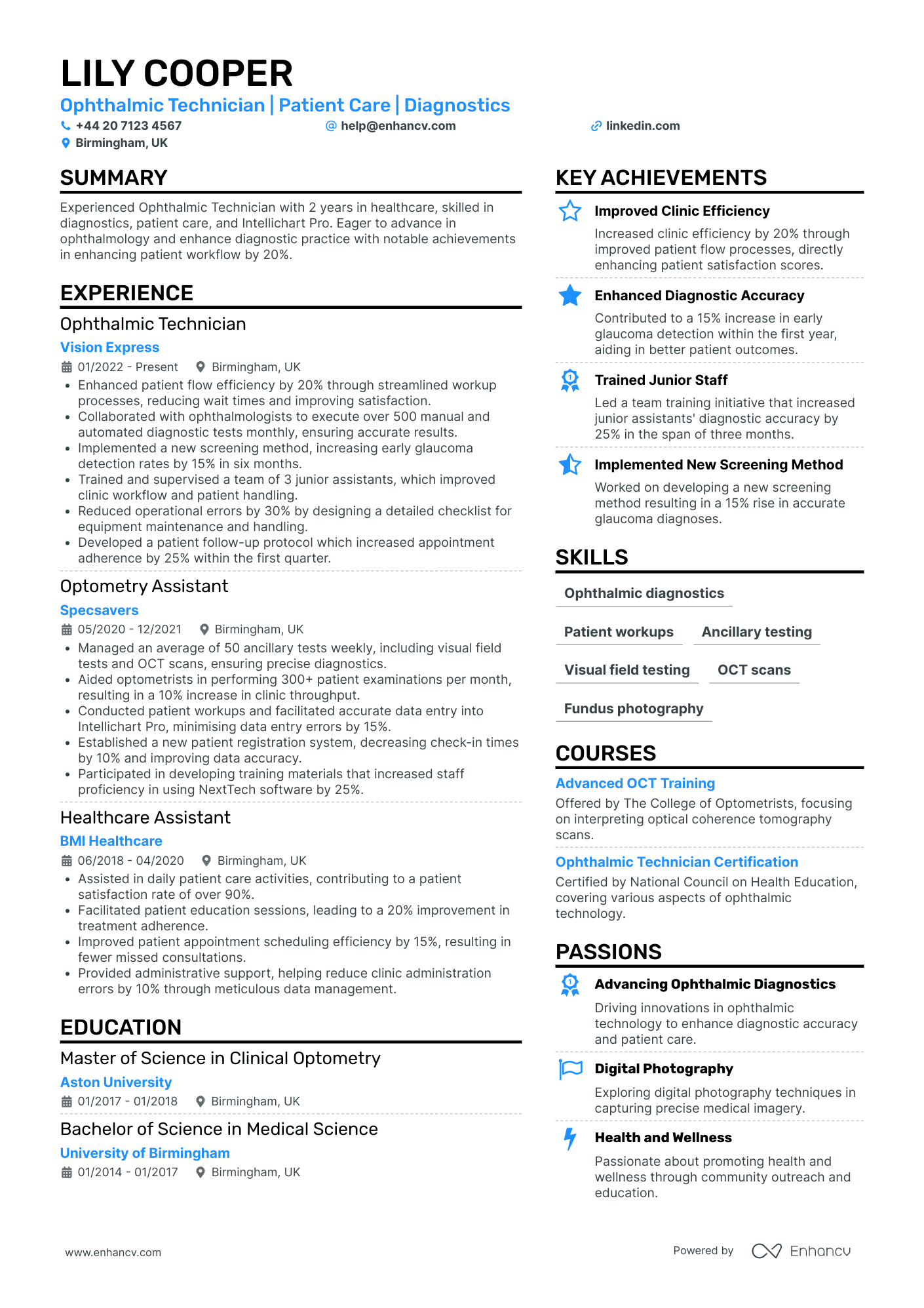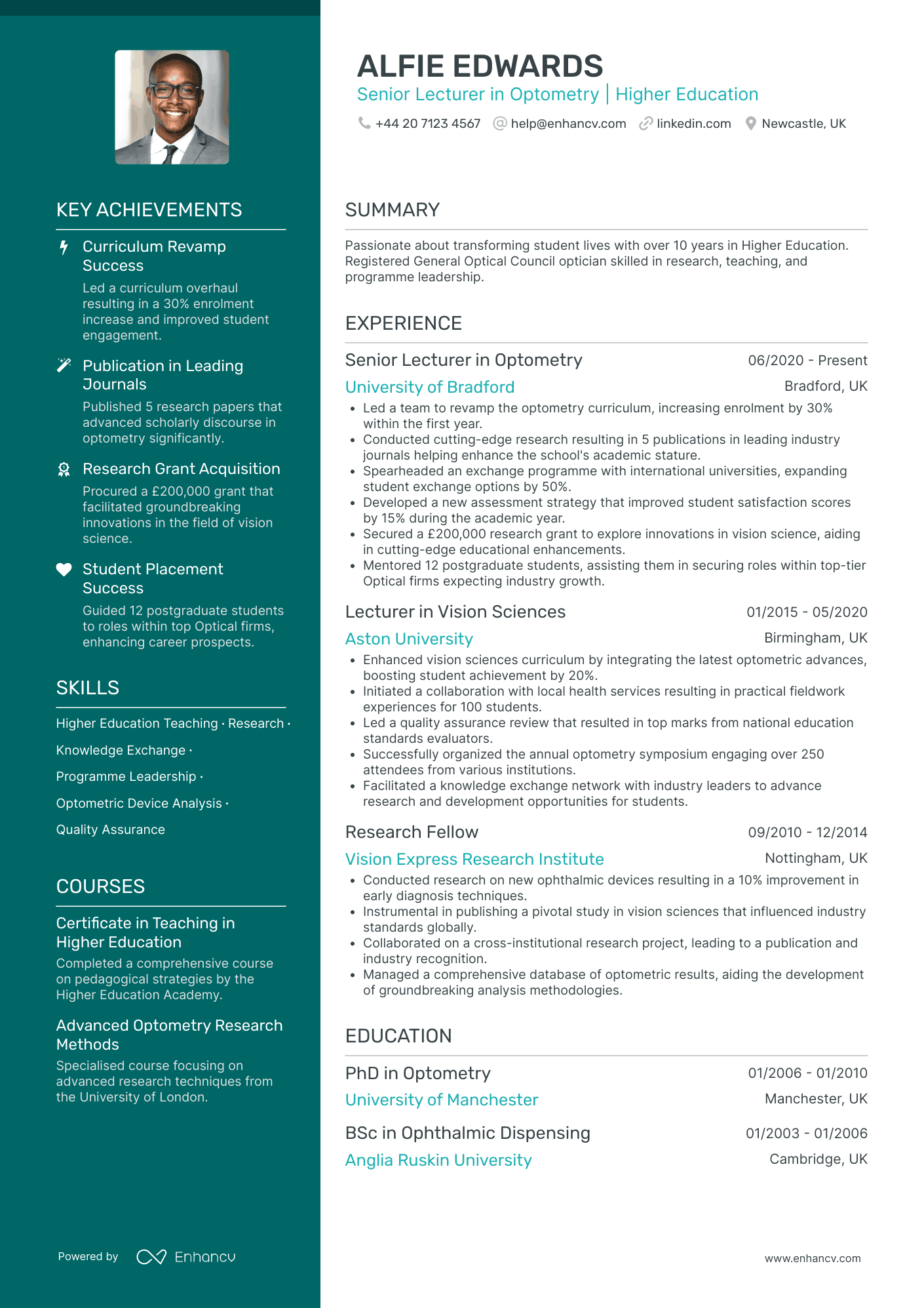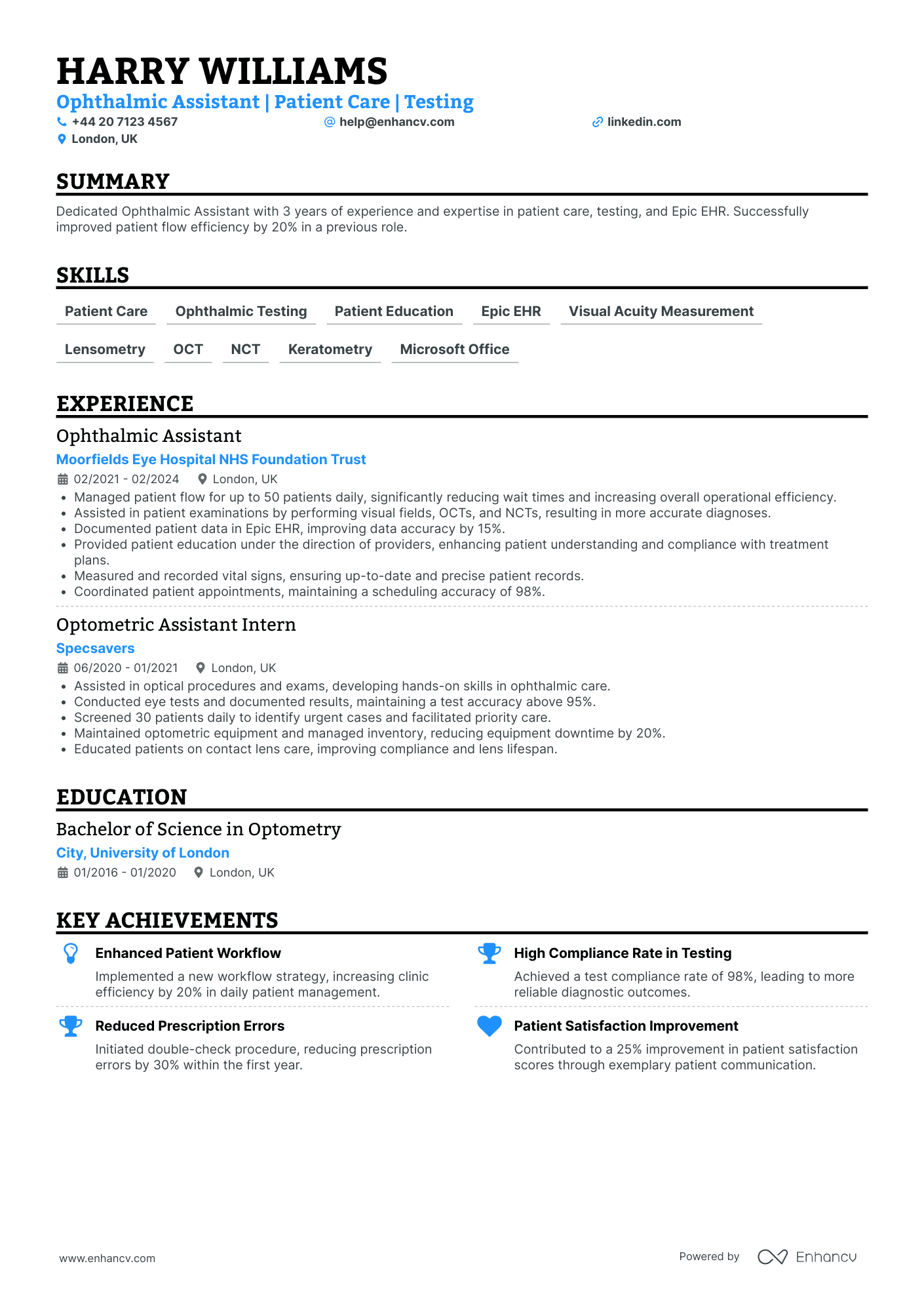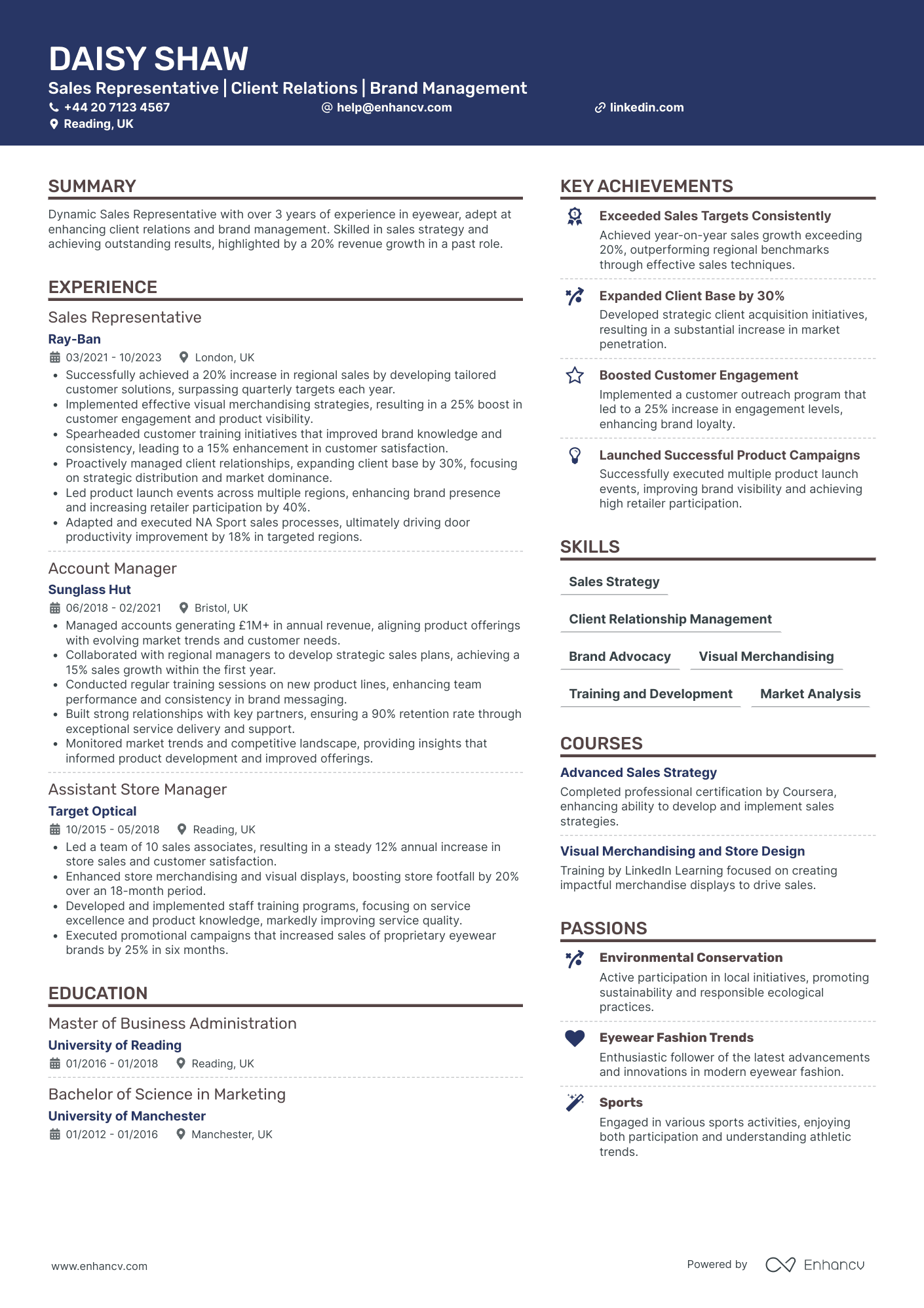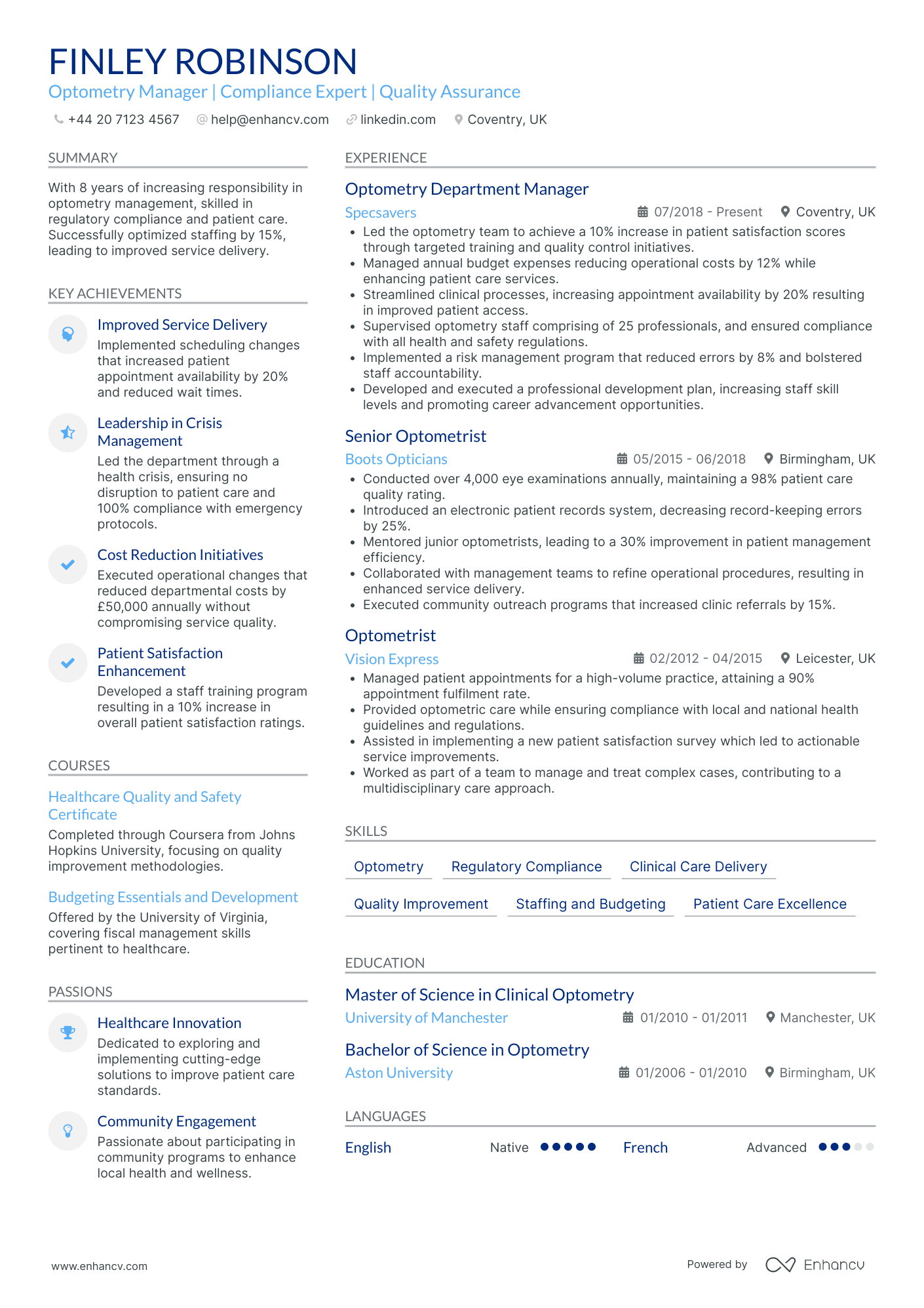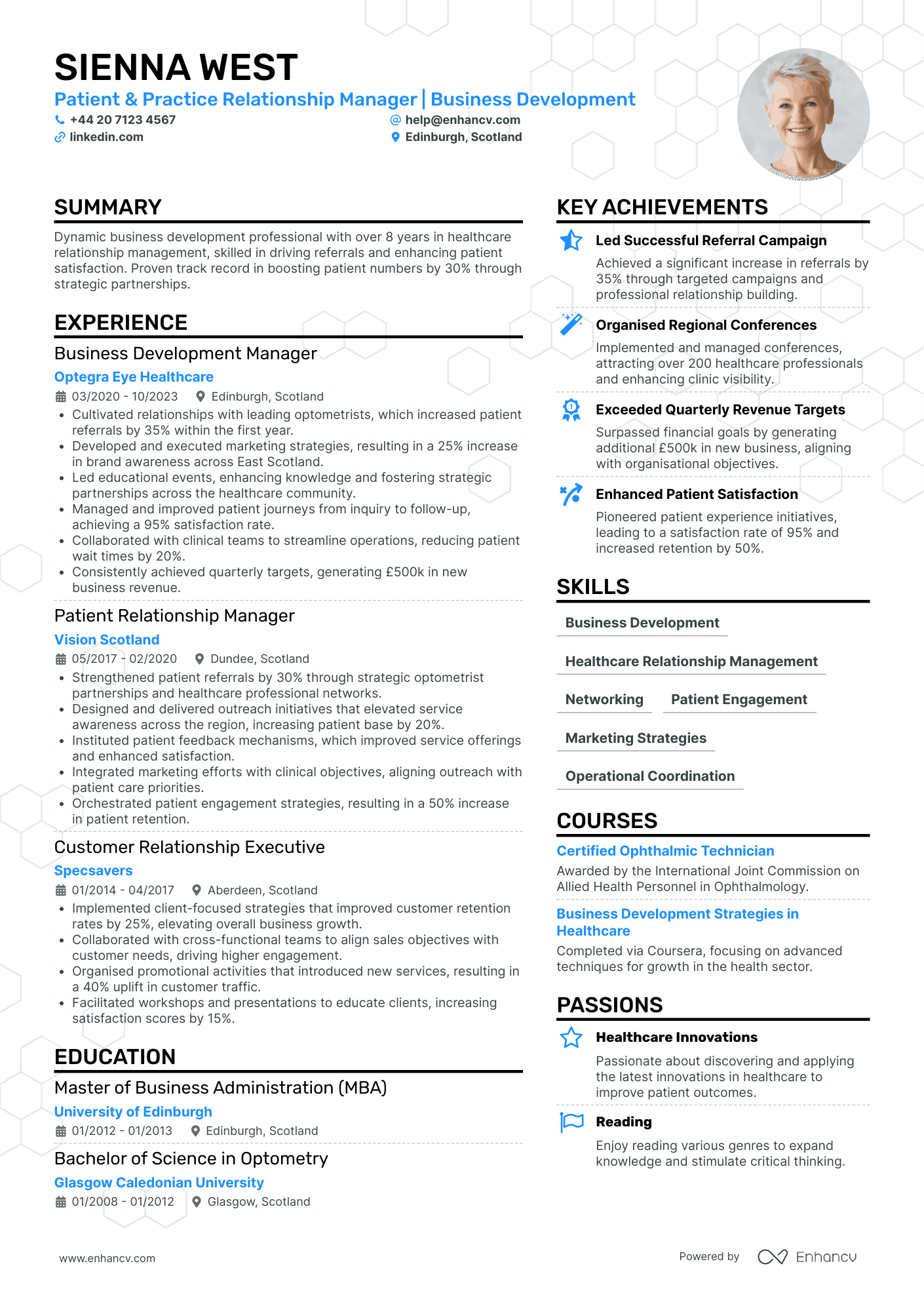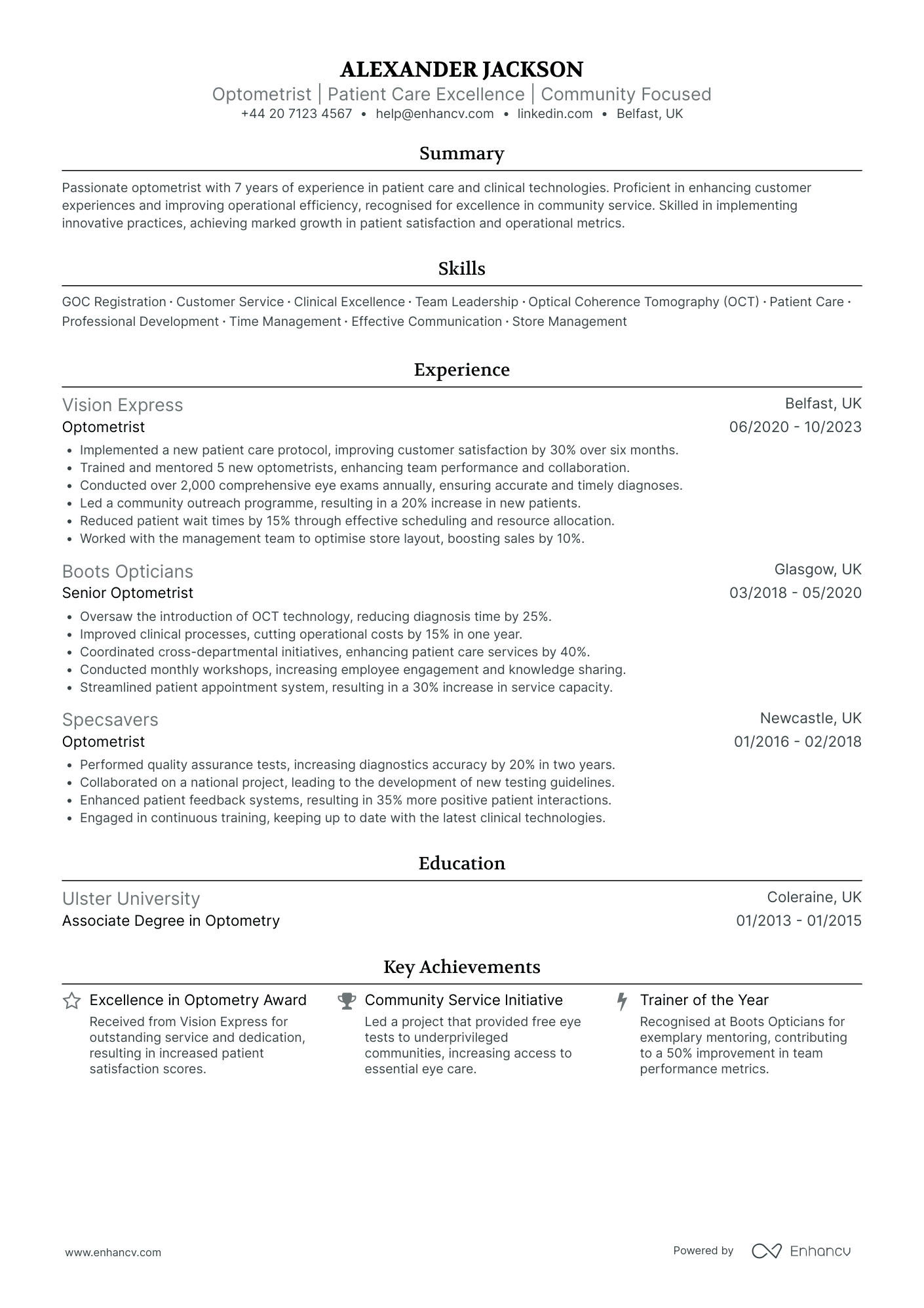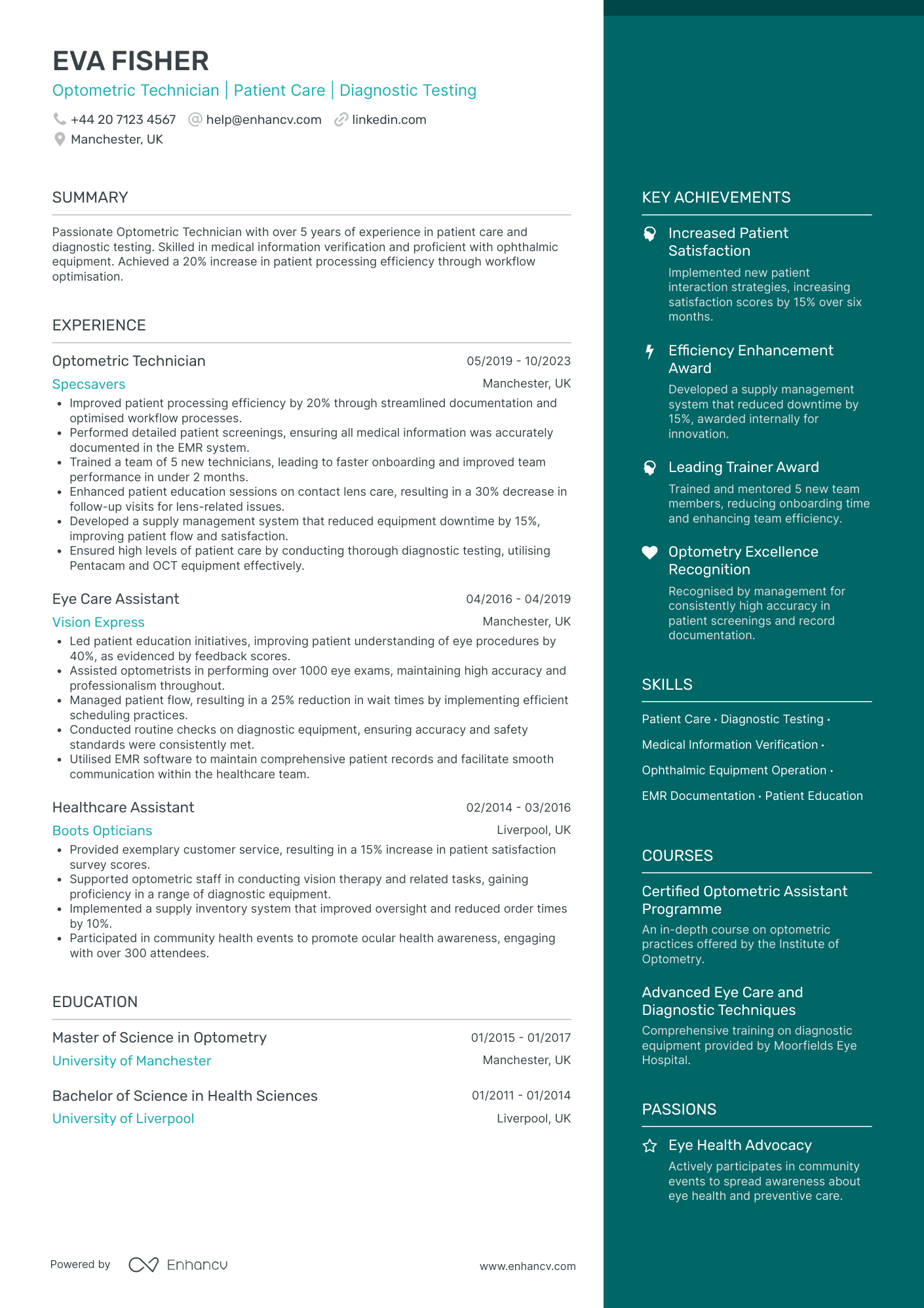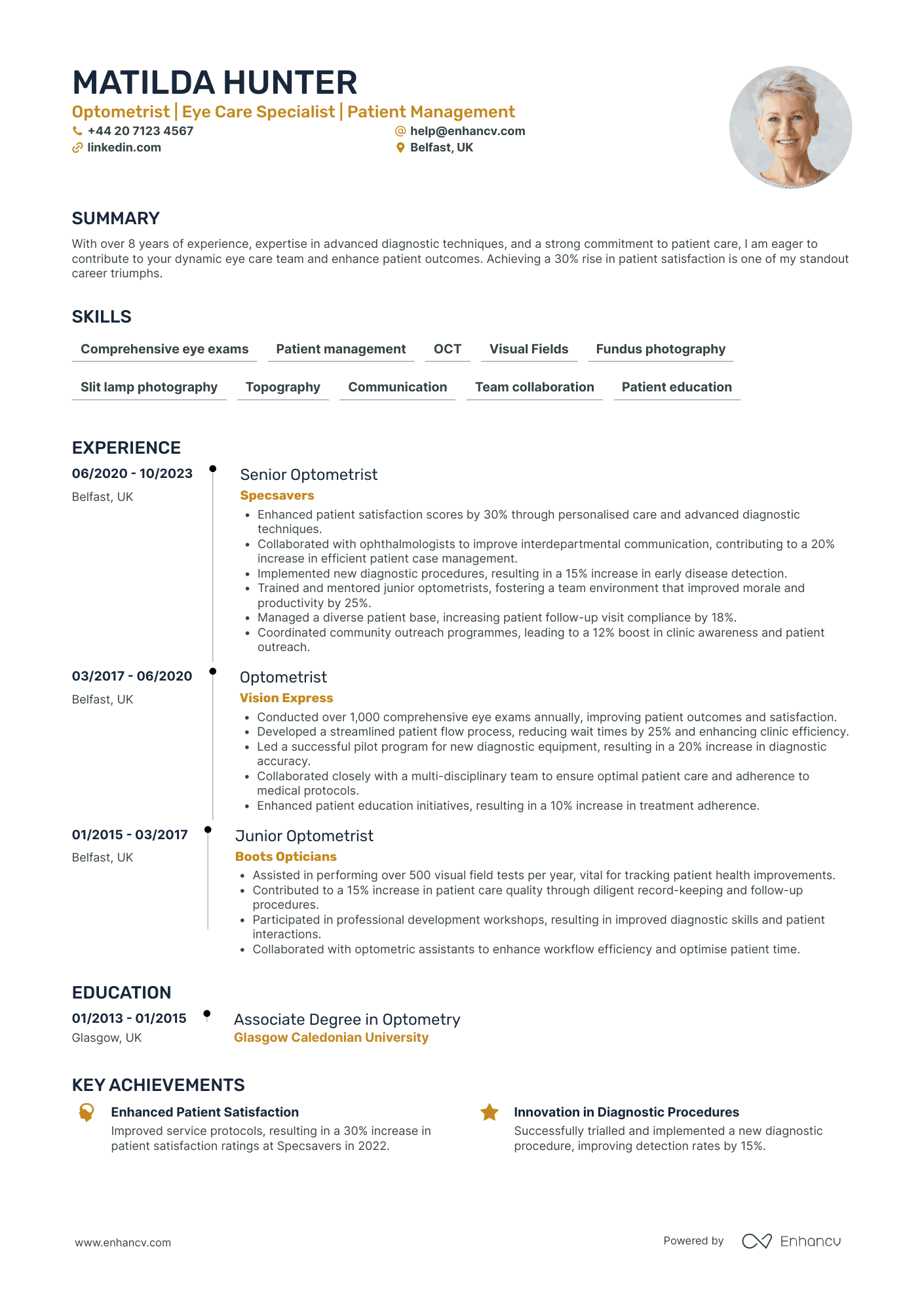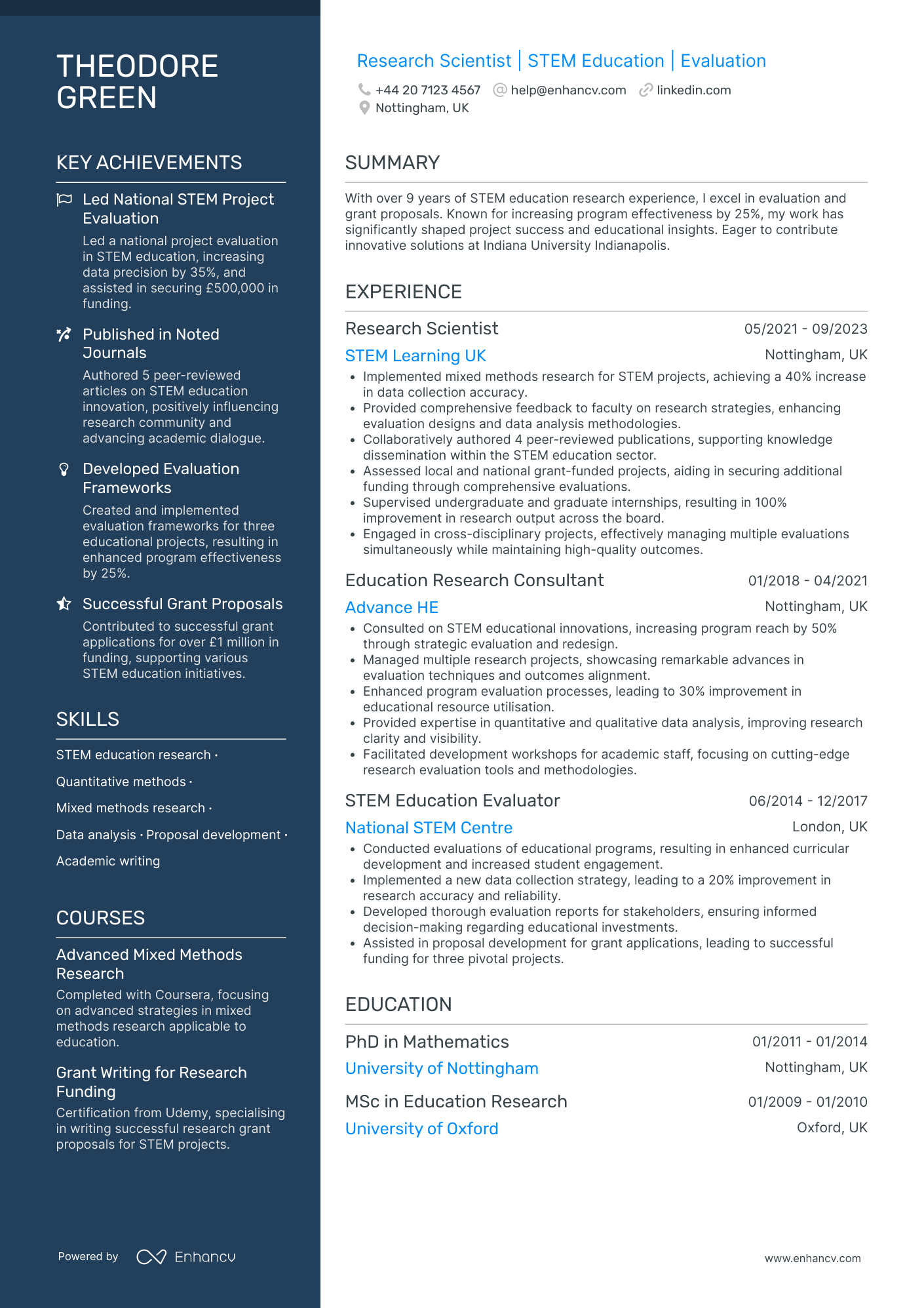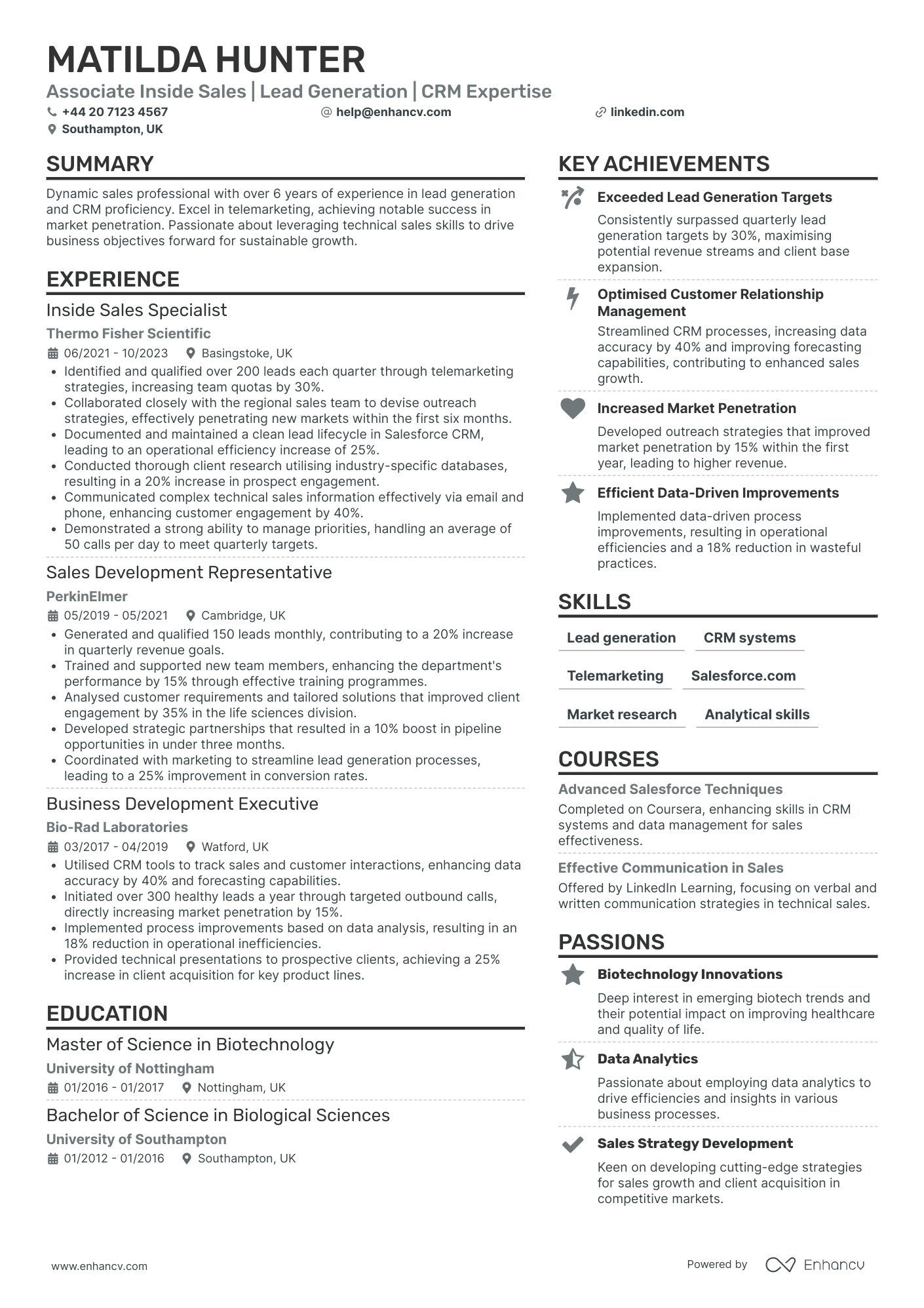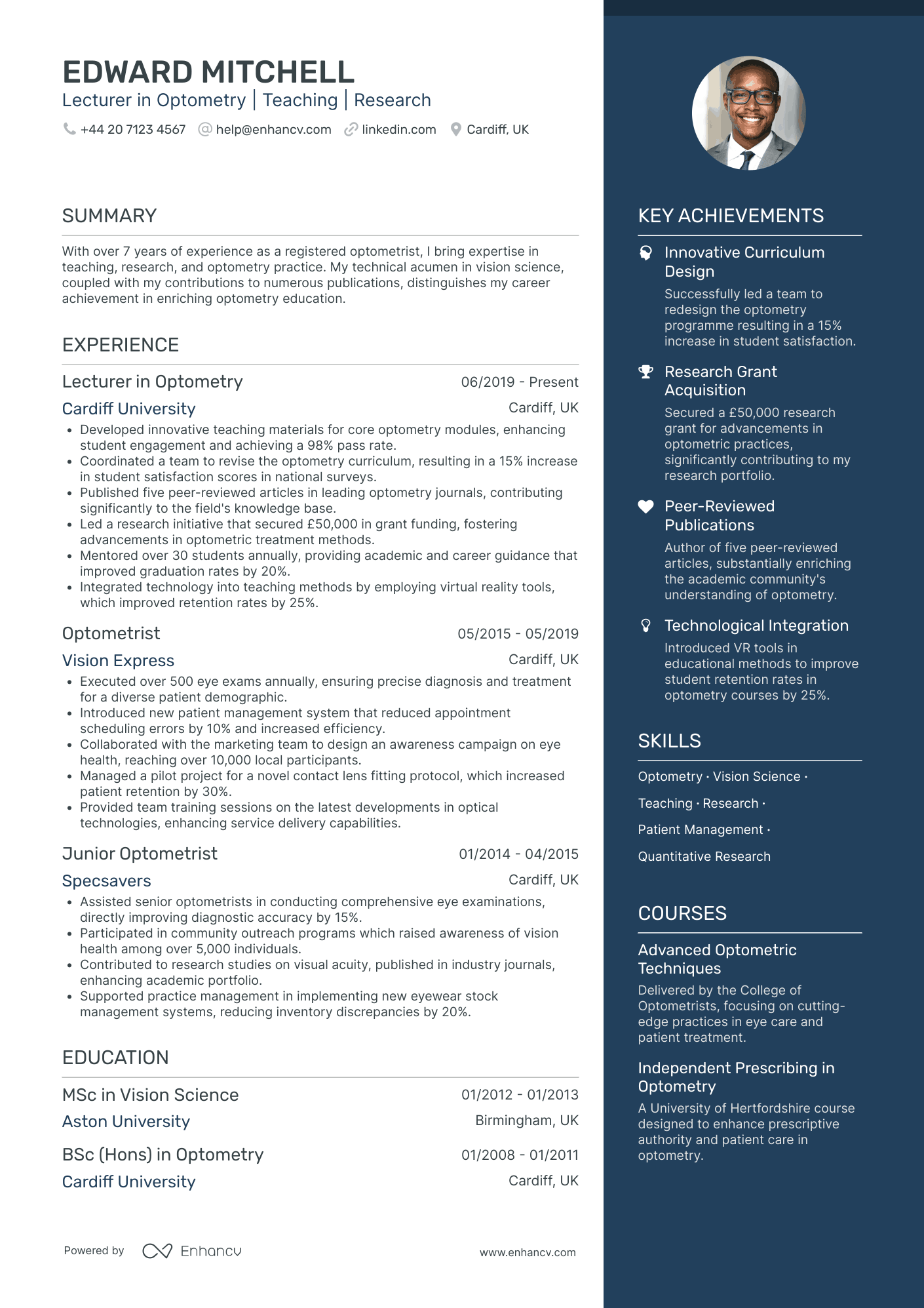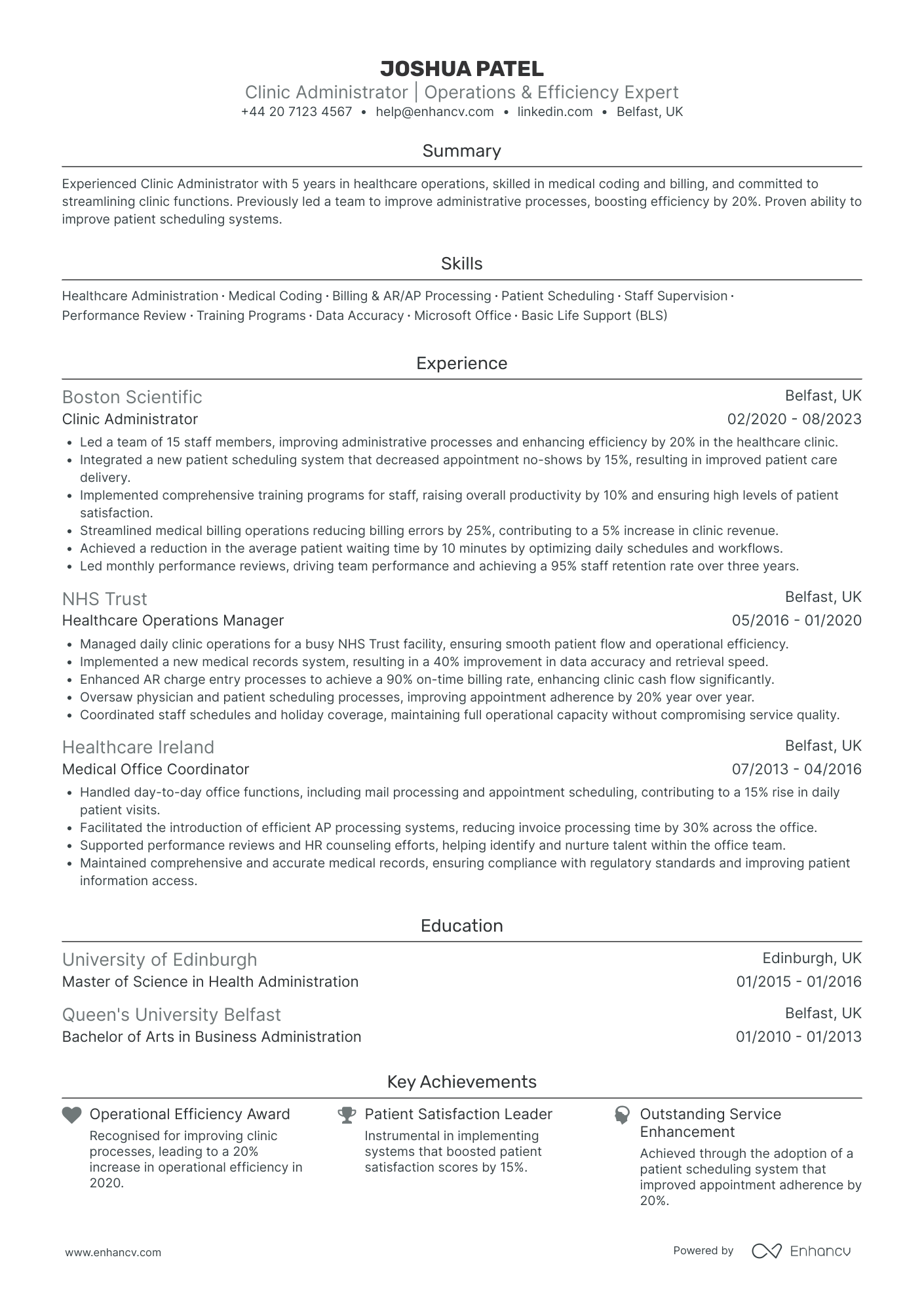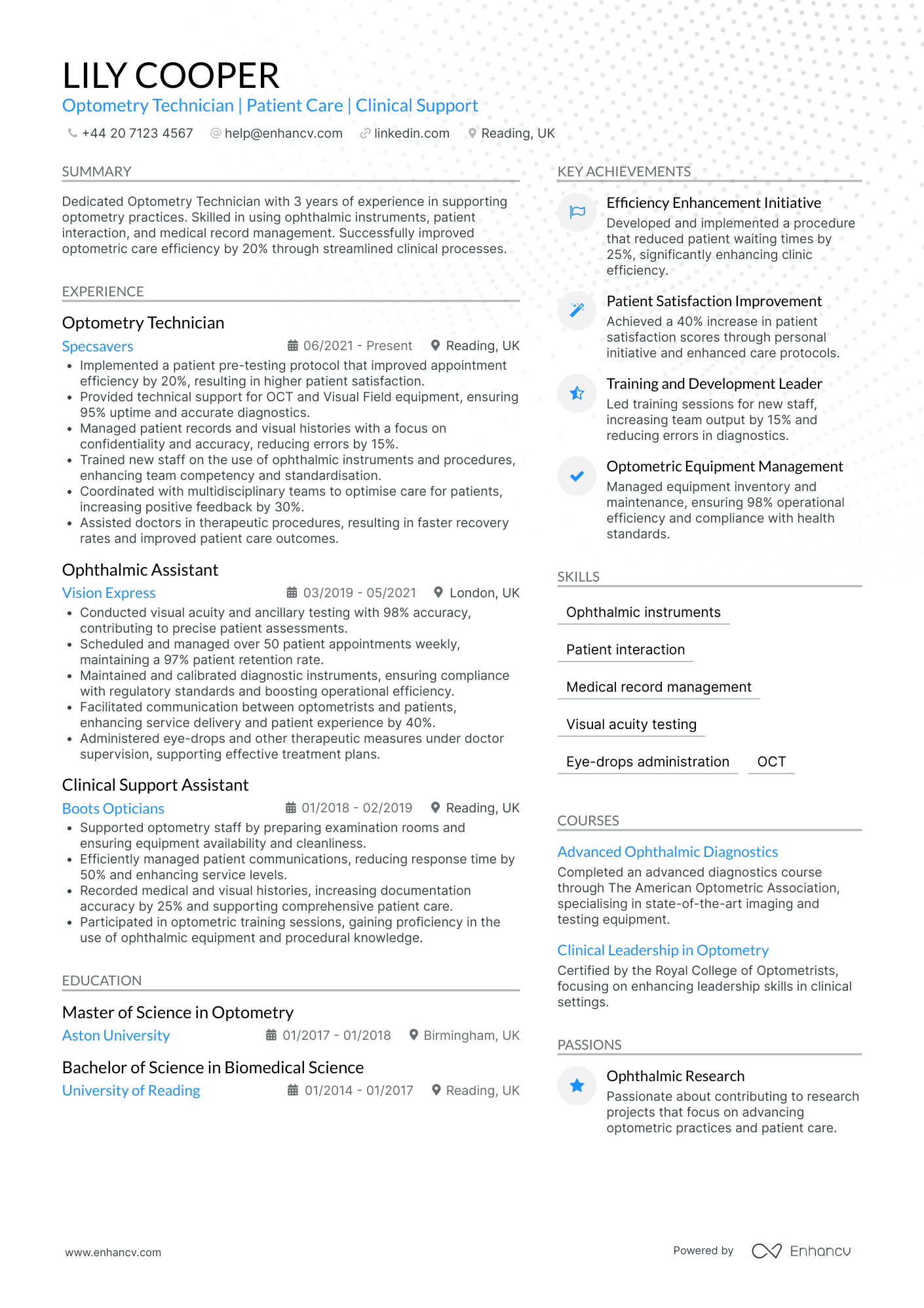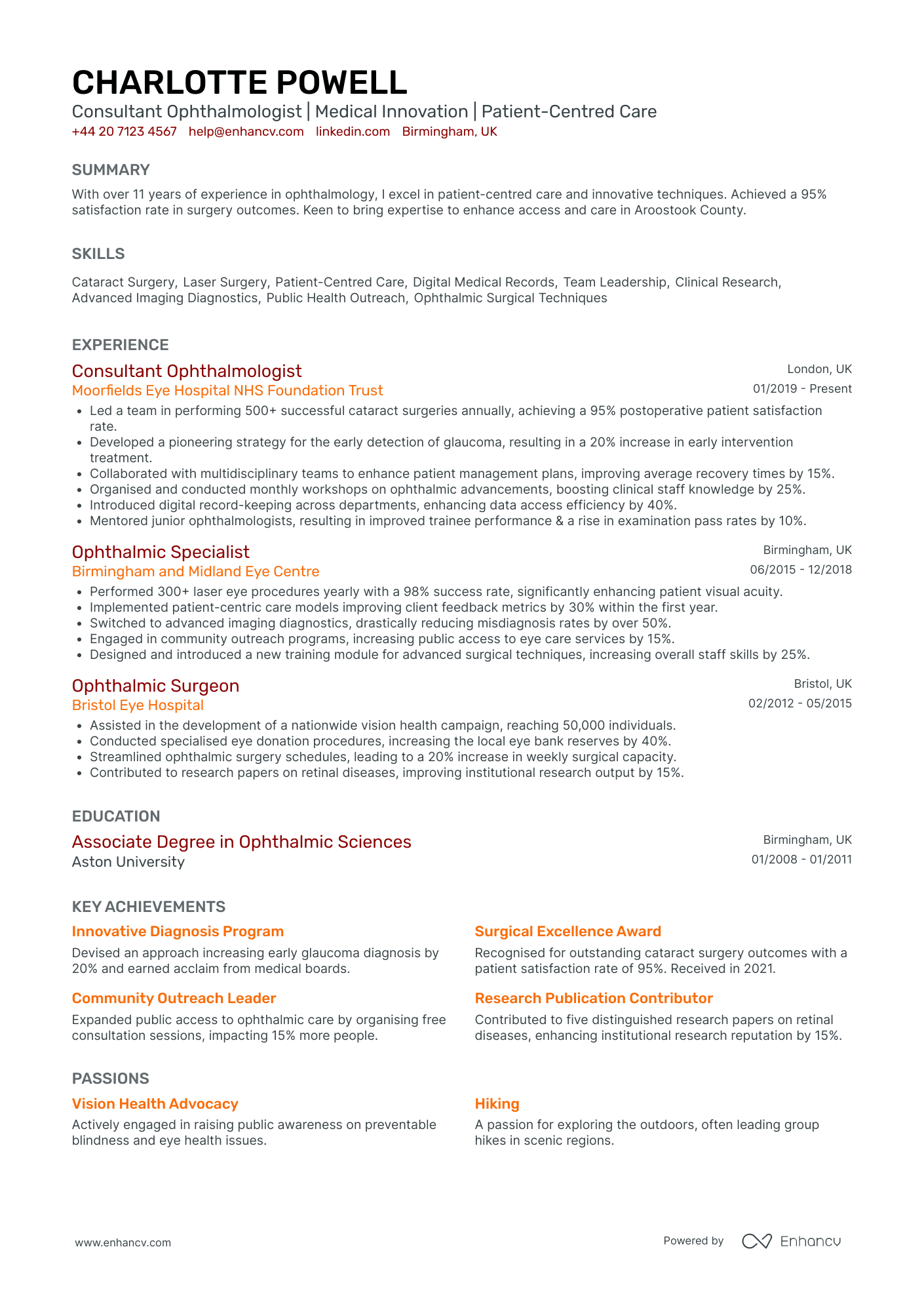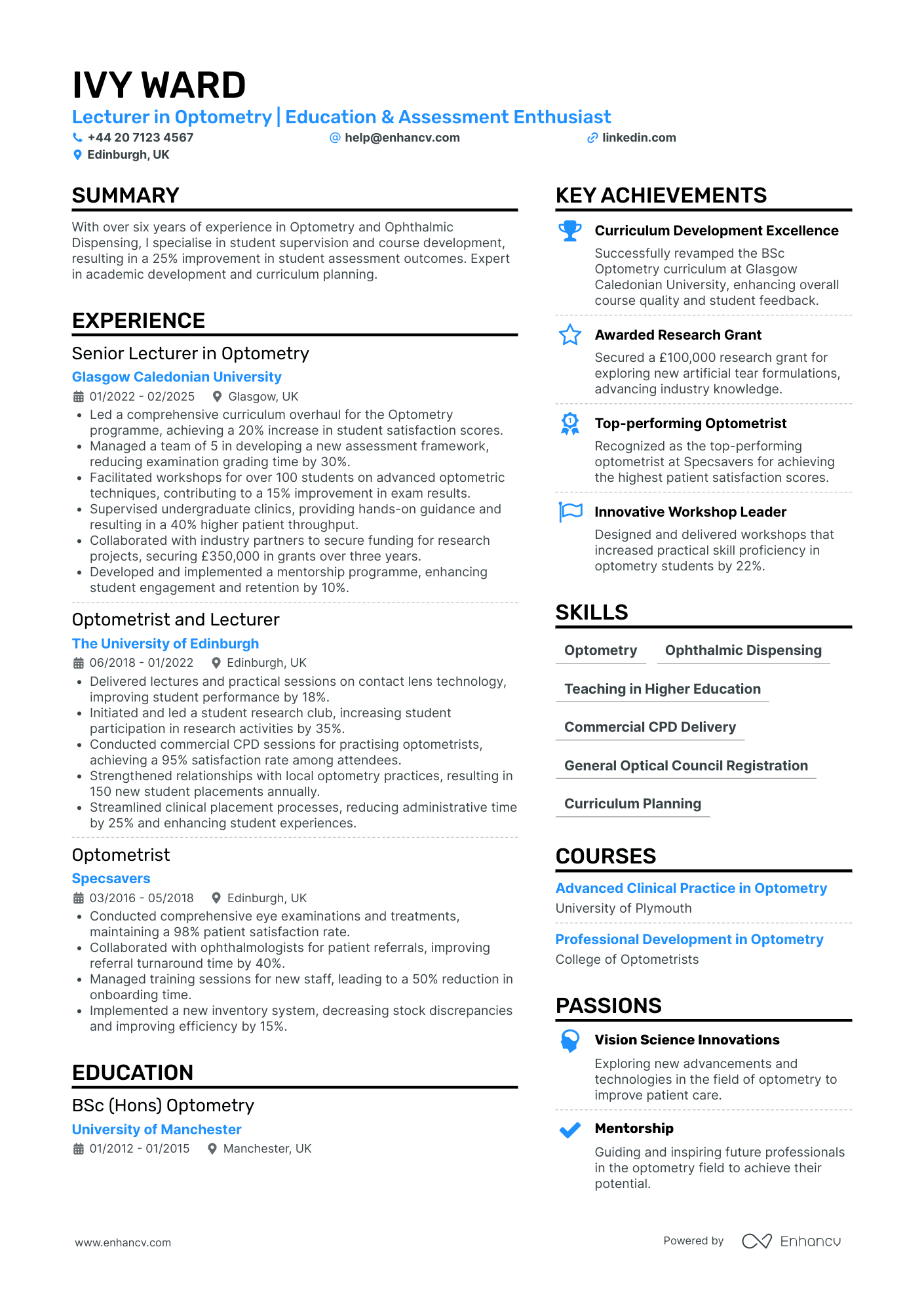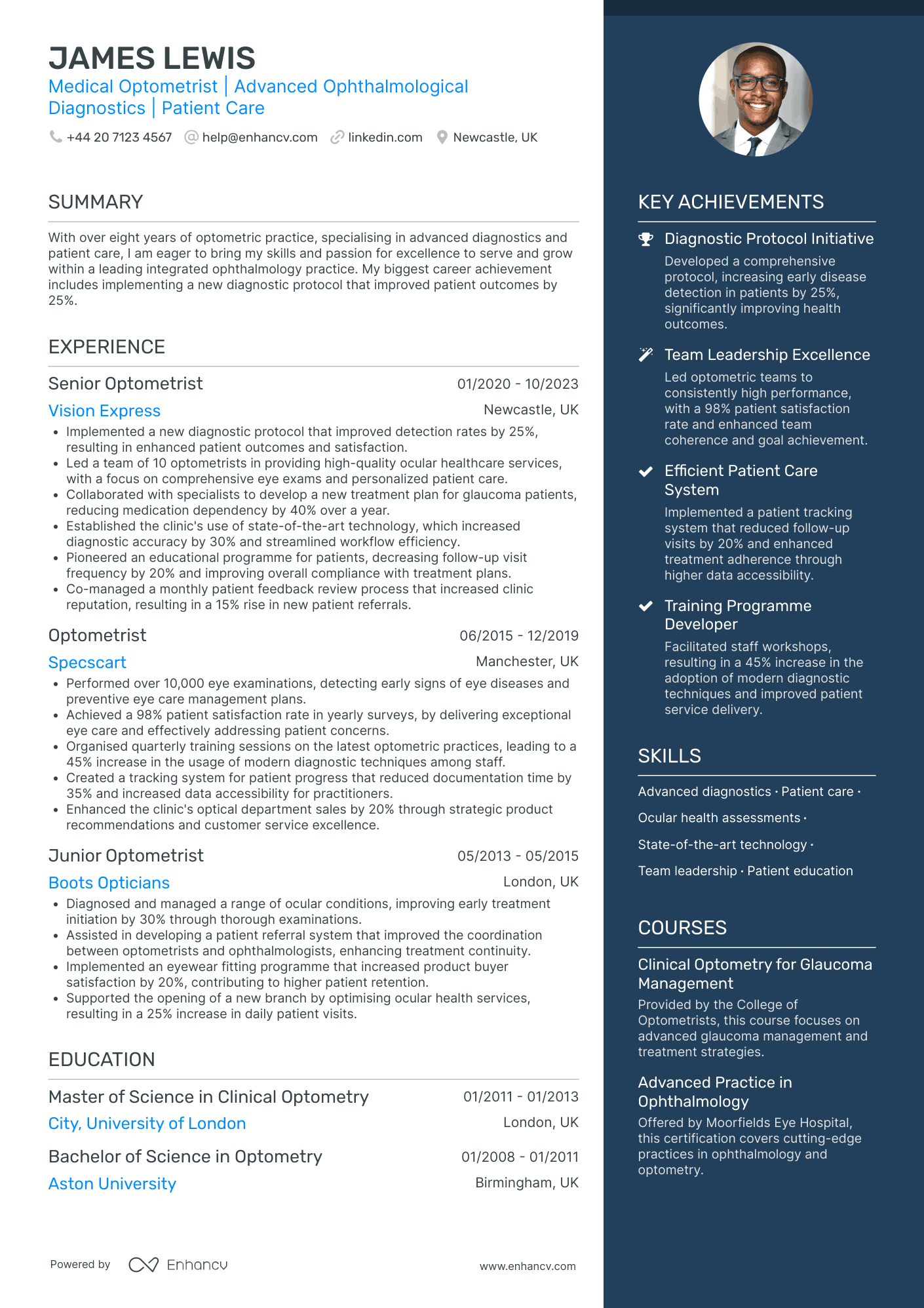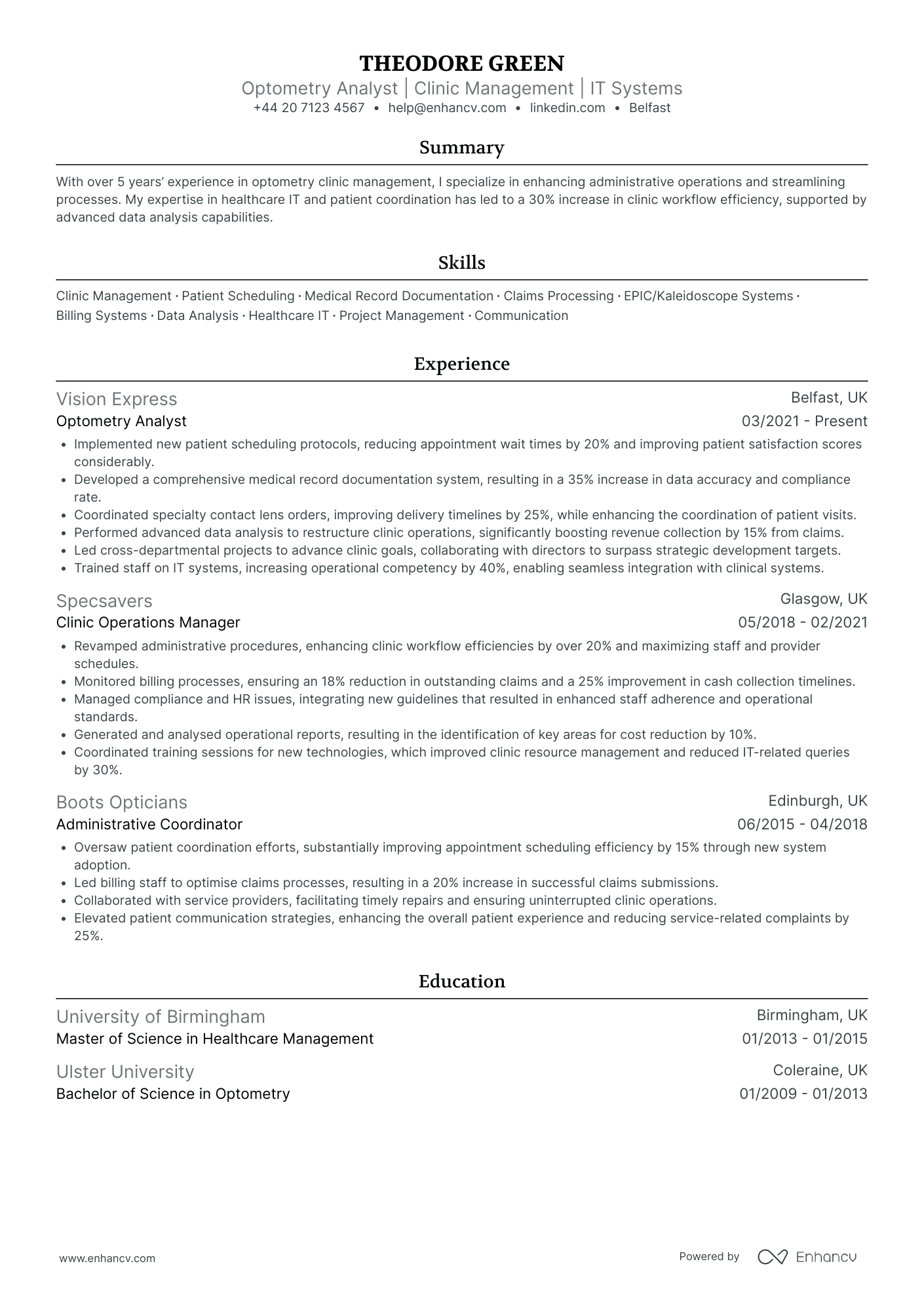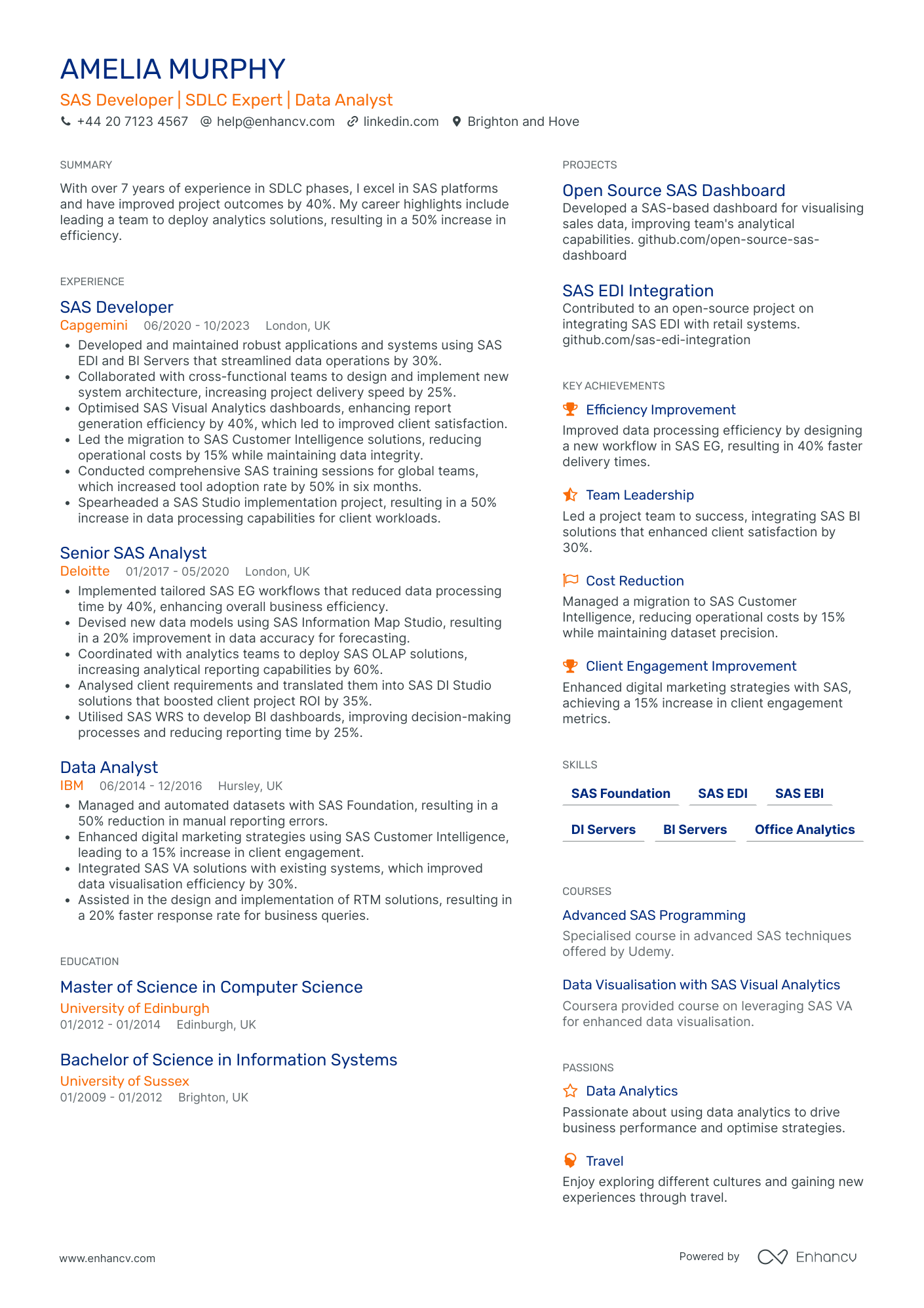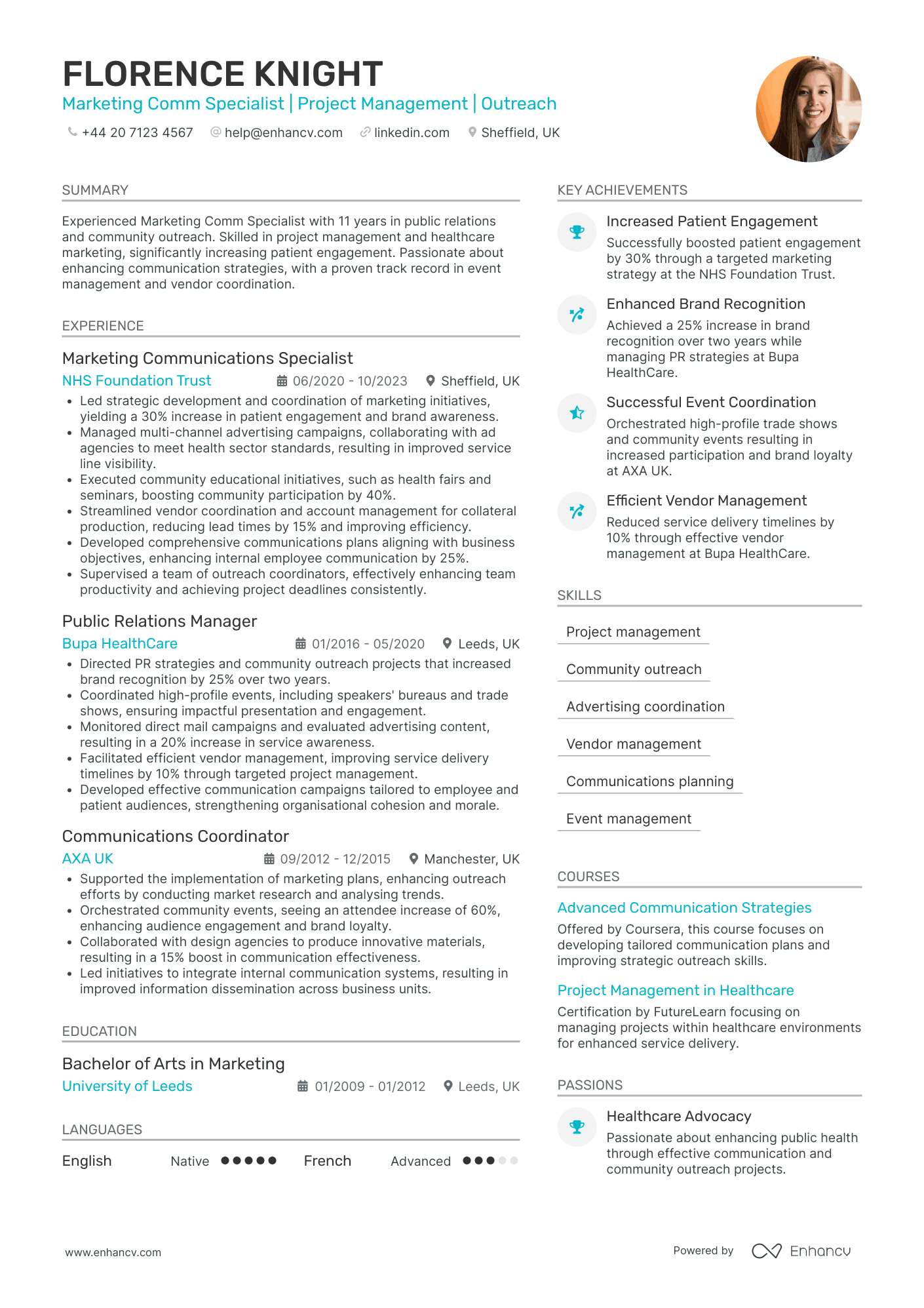Keeping up with the rapid advancements in ocular diagnostic technology stands as a significant CV challenge in the field of optometry. By delving into our comprehensive guide, you'll uncover practical strategies to enhance your CV, ensuring it accurately reflects your expertise with the latest innovations and sets you apart in the job market.
- Answer job requirements with your optometry CV and experience;
- Curate your academic background and certificates, following industry-leading CV examples;
- Select from +10 niche skills to match the ideal candidate profile
- Write a more succinct experience section that consists of all the right details.
Do you need more specific insights into writing your optometry CV? Our guides focus on unique insights for each individual role:
CV examples for optometry
By Experience
Trainee Optometry Technician
- Focused Career Progression - Lily Cooper's CV highlights a clear trajectory within the ophthalmic field, moving from a Healthcare Assistant to an Ophthalmic Technician, showcasing growth through gaining specialized skills and assuming leadership responsibilities.
- Technical Proficiency in Industry-Specific Tools - The resume emphasizes Lily's adeptness in using specialized ophthalmic tools such as Intellichart Pro and NextTech, which are crucial for accurate diagnostics and efficient patient management in an ophthalmology setting.
- Leadership and Impactful Achievements - Lily's leadership capabilities are underscored through initiatives like training junior staff, which resulted in improved diagnostic accuracy and efficiency, and the implementation of a new patient follow-up protocol that significantly raised appointment adherence, demonstrating her ability to influence clinic operations positively.
Senior Optometry Lecturer
- Organized presentation that emphasizes strength - Alfie Edwards' CV is well-structured and concise, effectively highlighting his key accomplishments and skills. The clear section headings and bullet points make it easy to skim through and grasp the essential information, providing a snapshot of his professional journey and achievements.
- Progressive career trajectory in academia - Alfie's career shows significant growth within the field of higher education, progressing from a Research Fellow to a Senior Lecturer. His promotions reflect both his expanding expertise in optometry and his increasing leadership responsibilities, illustrating his sustained commitment to academic excellence.
- Emphasis on impactful education reform - The CV details numerous significant contributions to curriculum development and student satisfaction, emphasizing Alfie's role in enhancing the educational experience. His success in revamping curriculums, increasing enrollments, and securing research grants demonstrate both strategic initiative and a focus on long-term academic improvements.
Junior Optometry Assistant
- Clear and systematic content presentation - The CV is well-organized and concise, presenting information in a logical flow. Each section is clearly defined, with bullet points making it easy to digest the key responsibilities and achievements quickly. This clarity ensures that readers, especially hiring managers and recruiters, can identify the candidate's qualifications and contributions in a matter of seconds, thus enhancing the overall readability and impact of the document.
- Demonstrated career growth and consistent industry focus - Harry Williams' career trajectory shows a focused and steady path within the ophthalmic care field. Starting as an Optometric Assistant Intern and progressing to an Ophthalmic Assistant, Harry has demonstrated upward movement while maintaining a consistent industry focus, which highlights dedication to his field and a commitment to growth within the healthcare sector. Such a trajectory is appealing to employers as it underscores both reliability and ambition.
- Industry-specific skills and specialized knowledge - The CV highlights specific tools and methodologies crucial to ophthalmic care, such as Epic EHR, OCT, and NCT. This technical depth is complemented by certifications like the Ophthalmic Clinical Assistant Certification, underscoring advanced skills in the field. Including these specialized skills ensures that the candidate is seen as highly qualified for roles requiring expertise in ophthalmic procedures and patient care management.
Entry-Level Optometry Sales Representative
- Detailed Career Growth - The CV effectively illustrates Daisy Shaw's career progression within the eyewear industry, moving from an Assistant Store Manager to a Sales Representative role. This upward trajectory highlights her ability to take on increasing responsibilities and achieve significant successes in sales growth and client expansion over the years.
- Emphasis on Sales Strategies and Impacts - It adeptly presents the business relevance of Shaw's achievements, showcasing how her tailored customer solutions and strategic sales processes led to substantial revenue growth and enhanced brand visibility. Her ability to boost sales by 20% and expand the client base underscores her impact on the companies she was involved with.
- Soft Skills and Leadership Aptitude - Shaw’s soft skills are well depicted through her experience in training, client relationship management, and leadership roles. Her success in spearheading initiatives, leading teams, and her strategic approach to enhancing customer satisfaction speak to her capability to foster positive interpersonal interactions and drive team performance.
Experienced Optometry Practice Manager
- Cohesive Structure and Clarity - Finley Robinson's CV is structured clearly, ensuring that all sections are easily navigable. Each job experience entry is presented in a concise manner, focusing on key responsibilities and achievements that provide a clear narrative of career progression without overwhelming the reader.
- Progressive Career Growth in Optometry - The CV highlights a well-defined career trajectory, from working as an Optometrist to advancing into a managerial role. This progression showcases not only professional growth but also an expanding scope of responsibilities, especially in enhancing operational efficiency and strategic management within the industry.
- Emphasis on Industry-Specific Achievements - The document includes specific achievements like developing risk management programs and optimizing patient access. Finley's introduction of an electronic patient records system and community outreach initiatives indicate a strong understanding of both the technological and interpersonal aspects of optometry.
By Role
Optometry Practice Manager
- Structured and Clear Presentation - The CV is meticulously structured, with clearly defined sections such as Experience, Education, Skills, and Achievements. Each section is concise yet comprehensive, ensuring that all relevant information is presented in an organized manner. The use of bullets effectively highlights key points, making the CV easy to read and navigate.
- Impressive Career Progression - Sienna West's career trajectory showcases consistent growth within the healthcare relationship management field. Starting as a Customer Relationship Executive and advancing to a Business Development Manager, her career reflects a persistent upward movement and increasing responsibility, underlining her commitment and capability within the industry.
- Impactful Achievements Highlight Business Relevance - The CV goes beyond mere numbers by illustrating the tangible impact of Sienna's work. Achievements like exceeding quarterly revenue targets and enhancing patient satisfaction not only demonstrate business acumen but also show her ability to drive significant improvements that directly align with organizational goals. This emphasis on measurable impact effectively communicates her business relevance to potential employers.
Optometry Assistant
- Content Clarity and Structure - The CV is meticulously structured, beginning with a comprehensive summary that clearly outlines the candidate's experience and passion for community service and patient care. Each section, from experience to education, is concisely presented, offering a clean and efficient reading experience that allows key accomplishments and skills to stand out.
- Career Trajectory and Industry Growth - The progression from Optometrist roles in reputable companies like Specsavers and Boots Opticians to a leadership position at Vision Express demonstrates significant career growth. The continuous upward trajectory signifies professional advancement alongside meaningful contributions to patient care and process improvement.
- Achievements and Impact - The CV effectively highlights impactful achievements such as the Excellence in Optometry Award and the Community Service Initiative. Each accomplishment is backed by tangible results, such as a 30% increase in customer satisfaction, demonstrating a consistent focus on improving operational and patient care metrics.
Optometry Technician
- Exemplary Clarity and Structure - Eva Fisher’s CV is meticulously organized, with sections clearly delineated and succinctly presented. It begins with a concise summary, followed by well-structured experience and education sections, showcasing a logical progression in her career. The use of bullet points throughout aids readability and ensures that key achievements are highlighted effectively.
- Significant Career Growth and Specialization - Over the course of her career, Eva Fisher has demonstrated consistent professional growth, moving from a Healthcare Assistant to an Optometric Technician at prominent companies. This trajectory highlights her increasing expertise within the optometry field, alongside progressive responsibilities and a focus on patient care and diagnostic testing.
- Utilization of Advanced Ophthalmic Tools and Techniques - The CV showcases Eva’s adeptness with specialized ophthalmic equipment, such as the Pentacam and OCT, emphasizing her technical proficiency. Her experience in improving patient care processes through these technologies positions her as a specialist in diagnostic testing and medical information verification within optometry.
Paediatric Optometry Specialist
- Structured Layout with Clear Content Segmentation - The CV is neatly divided into sections that enhance readability and make it easy to navigate. Each section is clearly labeled, providing quick access to specific details such as experience, education, skills, and achievements. This structure allows potential employers to efficiently assess the candidate's qualifications and career history.
- Steady Career Growth and Leadership Development - Matilda Hunter's career trajectory demonstrates consistent professional growth and leadership development, moving from a Junior Optometrist to a Senior Optometrist position. This progression signifies her ability to take on more responsibilities, mentor junior staff, and implement innovative practices that enhance patient care and clinic management.
- Application of Advanced Diagnostic Tools and Practices - The CV highlights Matilda's proficiency with advanced diagnostic technologies, including OCT, fundus photography, and topography, which are essential in modern optometric practice. This technical expertise underscores her capability to improve patient outcomes through precise and early disease detection, setting her apart in the field.
Optometry Research Scientist
- Strong Focus on Education and Experience - The CV provides a robust overview of Theodore Green's educational background, with credentials from prestigious institutions like the University of Nottingham and the University of Oxford. This educational foundation is further solidified by his extensive experience in key roles such as Research Scientist and Education Research Consultant, illustrating a progressive career trajectory in STEM education.
- Diverse Skill Set and Adaptability - Theodore's CV effectively showcases a wide-ranging skill set that includes both technical skills such as Python and SPSS, and soft skills like project management and grant writing. His ability to engage in cross-disciplinary projects and manage multiple evaluations simultaneously speaks to his adaptability and capability to handle diverse roles and responsibilities effectively.
- Significant Achievements with Tangible Impact - The CV highlights Theodore's achievements with specific metrics, underscoring the impact of his work. From leading a national project evaluation that increased data precision by 35% to contributing to successful grant applications over £1 million, the achievements shown reflect his efficacy in creating real, measurable benefits in STEM education projects.
Optometry Sales Representative
- Structured Career Progression - Matilda Hunter's CV clearly illustrates a structured career progression within the sales and biotechnology industries. Starting as a Business Development Executive and rising to the role of Inside Sales Specialist at Thermo Fisher Scientific, her career trajectory reflects a consistent upward movement, demonstrating her growth and adaptability in increasingly responsible roles.
- Effective Use of Industry-Specific Tools - The CV includes a focus on industry-specific tools such as Salesforce CRM and demonstrates Matilda's expertise in utilizing these tools to streamline processes and increase operational efficiencies. This technical depth not only supports her role in sales but also aligns with industry trends in utilizing technology for enhanced customer relationship management.
- Remarkable Achievements and Business Impact - Matilda's accomplishments are effectively highlighted in the CV, with quantitative metrics that underscore her significant business impact. Notable achievements such as exceeding lead generation targets and optimizing customer relationship management underline her capacity to drive sales growth and improve market penetration, which is crucial for business success.
Optometry Lecturer
- Effective Content Presentation and Structure - The CV is well-organized into clearly defined sections such as experience, education, skills, and achievements, making it easy for readers to identify key information. The bulleted format used for responsibilities and achievements enhances the clarity and conciseness of the content, allowing quick and efficient skimming.
- Significant Career Advancement and Growth - Edward Mitchell's career trajectory shows a clear progression from a Junior Optometrist to a Lecturer in Optometry, evidencing growth and an increasing level of responsibility over time. This advancement not only demonstrates professional growth but also a deepening of expertise and leadership capabilities within the field of optometry.
- Technical Proficiency and Innovation in Optometry - The CV highlights Edward's technical depth through his proficiency in advanced optometric techniques and independent prescribing. His integration of virtual reality tools in teaching and the introduction of a contact lens fitting protocol that improved patient retention by 30% are standout elements showcasing his innovative approach within the industry.
Optometry Clinical Supervisor
- Impressive Career Progression - Joshua Patel's CV outlines a clear trajectory of career advancement within the healthcare industry, transitioning from a Medical Office Coordinator to Clinic Administrator. This demonstrates a strong pattern of growth and promotion, highlighting his ability to take on increased responsibilities over time.
- Focus on Operational Efficiency - The CV emphasizes Joshua's expertise in enhancing clinic operations and efficiency. His achievements detail specific improvements, such as streamlining scheduling and billing processes, reducing errors, and increasing clinic revenue, which are crucial for the role of a Clinic Administrator.
- Comprehensive Skill Set for Healthcare Administration - The inclusion of specialized skills like Medical Coding, Billing & AR/AP Processing, and Patient Scheduling showcases his industry-specific knowledge. Coupled with general administrative abilities, it presents a holistic skill set that aligns well with the demands of healthcare administration.
Optometry Office Administrator
- Structured Path of Professional Growth - Lily Cooper's career trajectory exhibits a clear path of progression within the optometry field, advancing from roles such as Clinical Support Assistant to Optometry Technician. This consistent upward movement indicates a dedicated professional growth and mastery of key competencies, aligning well with her chosen industry.
- Integration of Technical Tools and Methodologies - The CV highlights specific technical competencies, such as proficiency in ophthalmic instruments and diagnostic equipment maintenance. Lily's familiarity with innovative methodologies like patient pre-testing protocols and advanced diagnostic testing techniques portrays her deep understanding and adaptability to advanced clinical environments.
- Articulation of Impactful Achievements - The achievements section is exceptionally articulated, featuring quantifiable results linked to business impact. For instance, streamlining clinical processes led to a 20% improvement in care efficiency, showcasing her capability to enhance operational performance. These metrics underscore not only her personal success but also her contribution to the broader clinical setting.
Optometry Equipment Specialist
- Clear and Structured Content Presentation - The CV is structured in a highly organized manner, with each section clearly delineated and concise. Experience and achievements are presented with concise bullet points that effectively highlight Charlotte’s skills and accomplishments, making information easily digestible for potential employers.
- Continuous Career Growth and Industry Contributions - Charlotte’s career trajectory showcases significant growth within the ophthalmology field, progressing from an Ophthalmic Surgeon to a Consultant Ophthalmologist. Her roles have expanded in responsibility and complexity, reflecting both professional growth and her increasing impact in the industry, such as enhancing diagnostic strategies and mentoring junior colleagues.
- Industry-Specific Innovation and Impact - The CV highlights unique methodologies and tools specific to ophthalmology, such as pioneering strategies for glaucoma detection and introducing digital record-keeping. Such innovations emphasize Charlotte's commitment to advancing medical practices and enhancing patient care, underscoring her influence and technical depth in the field.
Dispensing Optometry Associate
- Clear and Structured Presentation - The CV is well-organized, with distinct sections for experience, education, skills, and achievements, enabling easy navigation and comprehension. Each section follows a logical flow, starting with a summary that concisely outlines the candidate's key strengths and achievements in optometry education and practice. Bullet points enhance readability and allow for quick scanning of important information.
- Impressive Career Trajectory - Ivy Ward's career progression demonstrates significant growth and development, moving from an optometrist role to becoming a senior lecturer at a prestigious university. This trajectory not only highlights her dedication to the field of optometry but also her ability to thrive in both clinical and educational settings, suggesting a well-rounded professional with an expanding influence in her industry.
- Industry-Specific Achievements and Impact - The CV highlights specific accomplishments within the optometry field that showcase Ivy's contributions to academic and clinical advancements. Her role in overhauling curricula and streamlining processes has resulted in improved student outcomes and satisfaction metrics, underscoring her capacity to effect positive change and drive results that benefit educational institutions and students alike.
Optometry Practice Consultant
- Structured Presentation with Clear Sections - The CV is meticulously organized with distinct sections for experience, education, and certifications, making it easy to navigate. A concise summary sets the stage, followed by well-delineated experience entries that highlight key achievements, offering clarity and ease of reading.
- Consistent Career Advancement within Optometry - The progression from Junior Optometrist to Senior Optometrist demonstrates a clear career trajectory and growth within the field. Each role highlights increased responsibilities and accomplishments, showcasing the candidate’s ability to adapt and excel in more senior positions over time.
- Emphasis on Technical Mastery and Tools - The CV details industry-specific methodologies such as advanced diagnostics and the implementation of state-of-the-art technology. This demonstrates the candidate's proficiency and dedication to enhancing ocular diagnostic capabilities, aligning well with the technical demands of a medical optometrist role.
Optometry Business Analyst
- Structured Content Presentation - Theodore Green's CV is meticulously structured with clear headings and bullet points, ensuring quick comprehension of his professional narrative. Each section is concise, allowing for an effortless evaluation of his qualifications and accomplishments, essential for busy recruiters assessing numerous applications.
- Strong Career Trajectory - Over the past eight years, Theodore has demonstrated consistent upward mobility in the optometry and clinic management field. His advancements from an Administrative Coordinator to an Optometry Analyst underscore a robust career trajectory, highlighting his growing responsibilities and expertise within the healthcare industry.
- Integration of Advanced Healthcare IT Systems - The CV highlights Theodore's proficiency in using specialized industry tools like EPIC/Kaleidoscope Systems, emphasizing his technical depth. His implementation of IT systems to streamline patient scheduling and billing processes indicates a strong capability to merge technology with healthcare operations, enhancing overall clinic efficiency and data management.
Optometry Software Developer
- Structured and Clear Presentation - The CV is well-structured with clearly defined sections, making it easy to navigate through Amelia's qualifications, experience, and expertise. This clarity ensures that potential employers can quickly assess her suitability for a SAS Developer role without being overwhelmed by too much information.
- Career Growth and Industry Focus - Amelia's career trajectory illustrates a logical progression from a Data Analyst at IBM to a SAS Developer at Capgemini, highlighting consistent growth in responsibility and expertise in the field. Each role showcases her advancement in SAS-related projects, emphasizing her depth of experience and commitment to the analytics industry.
- Technical Proficiency in SAS - The CV emphasizes Amelia's specialized skill set in SAS technologies, including SAS EDI, BI Servers, and Customer Intelligence. This focus on industry-specific tools and methodologies underscores her technical depth and her capacity to deliver significant data-driven solutions, making her a valuable asset in any analytics-focused team.
Optometry Marketing Specialist
- Comprehensive Career Advancement - The CV showcases a clear upward trajectory in Florence's career, reflecting her growth from a Communications Coordinator at AXA UK to a Marketing Communications Specialist at the NHS Foundation Trust. This progression highlights her expanding responsibilities, leadership capabilities, and increasing influence in the healthcare marketing sector.
- Impactful Achievements with Strategic Relevance - Florence's accomplishments are not merely quantitative but reflect significant business impact. For instance, the 30% increase in patient engagement and 25% brand recognition boost illustrate her effectiveness in strategic communication, directly influencing the organization's outreach and community interaction goals.
- Dynamic Presentation with Well-Defined Sections - The structure of the CV is clear and well-organized, facilitating a seamless reading experience. Key sections such as experience, education, skills, and achievements are distinct yet interconnected, effectively portraying Florence's qualifications and alignment with desired roles in marketing communication and community outreach.
Formatting your optometry CV to meet the role expectations
Staring at the blank page for hours on end, you still have no idea how you should start your professional optometry CV. Should you include more colours, two columns, and which sections? What you should remember about your CV format is this - ensure it's minimalistic and doesn't go over the top with fancy fonts and many colours. Instead, focus on writing consistent content that actually answers the job requirements. But, how about the design itself :
- Use the reverse chronological order to showcase your experience, starting with your most recent role;
- Include your contact details (email address, phone number, and location) - and potentially your professional photo - in the header;
- Must-have CV sections include summary or objective, experience, education, and skills: curate the ones that fit your profile;
- Your professional optometry CV should be between one-to-two pages long: select the longer format if you have more experience.
A little bit more about your actual CV design, ensure you're using:
- plenty of serif or sans serif font (e.g. Montserrat, Exo 2, Volkhov) as they are Applicant Tracker System (ATS) compliant. Avoid the likes of Arial and Times New Roman because most candidates' CVs are in this typography.
When submitting your CV, are you still not sure what format it should be? Despite the myth that has been circling around, most modern ATS systems are perfectly capable of reading PDFs. This format is an excellent choice as it keeps all of your information intact.
PRO TIP
Be mindful of white space; too much can make the CV look sparse, too little can make it look cluttered. Strive for a balance that makes the document easy on the eyes.
The top sections on a optometry CV
- Professional Registration clarifies the optometrist's accredited body.
- Clinical Skills and Competencies showcase expertise in eye care.
- Education and Qualifications confirm academic and professional training.
- Relevant Work Experience highlights practical optometry engagements.
- Optometry Awards and Honours demonstrate recognition and excellence in the field.
What recruiters value on your CV:
- Highlight your clinical experience by detailing the types of optometric services you've provided, such as eye exams, vision tests, diagnosis of visual diseases, and lens prescriptions.
- Include any specialisations or additional qualifications in optometry, for instance, if you are skilled in paediatric optometry, contact lens fitting, or have expertise in managing ocular diseases.
- Emphasise your patient care skills by mentioning your ability to communicate effectively, educate patients about eye care, and provide excellent customer service.
- Feature any technological proficiencies you have with optometric equipment and software, such as visual field analysers, retinal cameras, or electronic health records.
- Document your professional affiliations and contributions to the field, like memberships in optometric societies or involvement in research, to demonstrate your commitment to the profession.
Recommended reads:
What information should you include in your optometry CV header?
The CV header is potentially the section that recruiters would refer to the most, as it should include your:
- Contact details - your professional (non-work) email address and phone number;
- Professional photograph - if you're applying hinting at the value you bring as a professional.
Many professionals often struggle with writing their optometry CV headline. That's why in the next section of this guide, we've curated examples of how you can optimise this space to pass any form of assessment.
Examples of good CV headlines for optometry:
- Lead Optometrist | Glaucoma Specialist | MSc in Clinical Optometry | 10+ Years Experience
- Associate Optometrist | Paediatric Eye Care Expert | BSc Optometry | 5 Years Clinical Practice
- Senior Optometrist | Contact Lens & Refraction | PhD Vision Science | 15+ Years Professional Insight
- Consultant Optometrist | Low Vision Aid Authority | FCOptom | 20 Years Dedicated Service
- Specialist Optometrist | Myopia Control Innovator | DipOptom | 8 Years Progressive Experience
- Optometry Manager | Business Strategy & Patient Care | MOptom | 12 Years Industry Leadership
Choosing your opening statement: a optometry CV summary or objective
At the top one third of your CV, you have the chance to make a more personable impression on recruiters by selecting between:
- Summary - or those three to five sentences that you use to show your greatest achievements. Use the CV summary if you happen to have plenty of relevant experience and wish to highlight your greatest successes;
- Objective - provides you with up to five sentences to state your professional aims and mission in the company you're applying for
CV summaries for a optometry job:
The best formula for your optometry CV experience section
The CV experience section is the space where many candidates go wrong by merely listing their work history and duties. Don't do that. Instead, use the job description to better understand what matters most for the role and integrate these keywords across your CV. Thus, you should focus on:
- showcasing your accomplishments to hint that you're results-oriented;
- highlighting your skill set by integrating job keywords, technologies, and transferrable skills in your experience bullets;
- listing your roles in reverse chronological order, starting with the latest and most senior, to hint at how you have grown your career;
- featuring metrics, in the form of percentage, numbers, etc. to make your success more tangible.
When writing each experience bullet, start with a strong, actionable verb, then follow it up with a skill, accomplishment, or metric. Use these professional examples to perfect your CV experience section:
Best practices for your CV's work experience section
- Demonstrated proficiency in conducting comprehensive eye exams, accurately diagnosing vision problems and eye diseases, and prescribing corrective lenses and medications.
- Experienced in utilising the latest optometric equipment and technologies, such as OCT, fundus cameras, and corneal topographers, for advanced patient assessment.
- Skilled in fitting contact lenses, including specialty lenses for conditions like astigmatism, keratoconus, and post-surgical correction, ensuring optimal comfort and vision.
- Expertise in managing ocular emergencies, providing immediate care for conditions like ocular trauma, foreign bodies, and acute infections.
- Implemented patient-friendly initiatives that improved appointment scheduling, patient education, and satisfaction in an optometric practice.
- Proven track record of working collaboratively with ophthalmologists for co-management of pre-operative and post-operative cataract and LASIK patients.
- Designed and conducted community eye care programs, such as vision screenings and health talks, promoting eye health awareness.
- Successfully adapted to a range of practice settings, including high street opticians, hospital eye services, and specialty clinics for conditions like glaucoma and macular degeneration.
- Engaged in continuous professional development, attending conferences and seminars to stay updated with advancements in optometric care and treatment options.
- Performed comprehensive eye exams on over 30 patients per week, identifying vision problems and health issues like hypertension and diabetes.
- Implemented a new patient follow-up protocol that increased patient retention by 20% within the first year.
- Collaborated with paediatricians to develop a child-friendly eye examination process that improved the clinic's family service offerings.
- Managed a team of 5 optometrists, scheduling shifts and organizing continuing education to improve service quality.
- Increased the range of optical products available in the practice, leading to a 15% growth in annual sales.
- Spearheaded the adoption of digital retinal photography, enhancing diagnostic accuracy and patient outcome.
- Provided specialised care in managing ocular diseases, successfully treating over 500 cases of advanced glaucoma and cataracts.
- Conducted research on new methods of myopia control, contributing findings to an industry-leading journal.
- Introduced a patient education initiative that resulted in a 25% improvement in compliance with treatment plans.
- Expanded clinic operations to include a full-service optical lab, reducing external costs by 30% and improving turnaround time for eyewear fulfillment by 50%.
- Launched a community outreach program offering free vision screenings, educating over 1,000 community members about eye health annually.
- Optimised the appointment booking system, resulting in a 40% reduction in wait times and significantly improving client satisfaction.
- Developed and led a comprehensive eye care program tailored to elderly patients, enhancing quality of life for over 300 residents in local care homes.
- Orchestrated the integration of advanced OCT imaging technology, elevating diagnostic precision in macular degeneration cases.
- Curated a selection of specialist lens treatments, resulting in the practice becoming a regional leader in custom vision solutions.
- Led a project to introduce tele-optometry services, connecting with remote patients and increasing practice reach by 35%.
- Coordinated a sunglasses and sports eyewear sales event that generated a record-breaking £50,000 in sales over a single weekend.
- Developed a referral program with local businesses that increased new patient appointments by 10%.
- Solely responsible for conducting vision therapy sessions, improving visual performance for over 200 patients with amblyopia and binocular vision disorders.
- Authored an educational booklet on eye health that was distributed in the community and praised by local health authorities.
- Negotiated with suppliers to introduce an eco-friendly frames line, appealing to environmentally conscious consumers and increasing related sales by 18%.
- Launched the first dry eye clinic in the area, using pioneering treatment methods to provide relief to over 1,000 patients.
- Guided a team expansion plan, onboarding and training 3 new optometrists to meet growing clinic demands.
- Implemented a new inventory management system that reduced eyewear stock discrepancies by 90%.
Writing your CV without professional experience for your first job or when switching industries
There comes a day, when applying for a job, you happen to have no relevant experience, whatsoever. Yet, you're keen on putting your name in the hat. What should you do? Candidates who part-time experience , internships, and volunteer work.
Recommended reads:
PRO TIP
Include examples of how you adapted to new tools, environments, or work cultures, showing your flexibility.
Key optometry CV skills: what are hard skills and soft skills
Let's kick off with the basics. You know that you have to include key job requirements or skills across your CV. For starters, take individual skills from the job description and copy-paste them into your CV, when relevant. Doing so, you'll ensure you have the correct skill spelling and also pass the Applicant Tracker System (ATS) assessment. There are two types of skills you'll need to include on your CV:
- Hard skills - technical abilities that are best defined by your certificates, education, and experience. You could also use the dedicated skills section to list between ten and twelve technologies you're apt at using that match the job requirements.
- Soft skills - your personal traits and interpersonal communication skills that are a bit harder to quantify. Use various CV sections, e.g. summary, strengths, experience, to shine a spotlight on your workspace achievements, thanks to using particular soft skills.
Remember that your job-winning CV should balance both your hard and soft skills to prove your technical background, while spotlighting your personality.
Top skills for your optometry CV:
Clinical Eye Care
Visual Acuity Testing
Diagnosis of Eye Diseases
Patient Education
Prescription of Corrective Lenses
Knowledge of Contact Lens Fitting
Ophthalmic Instrumentation Proficiency
Understanding of Ocular Pharmacology
Glaucoma Management
Digital Retinal Imaging
Communication Skills
Problem-Solving
Empathy
Attention to Detail
Interpersonal Skills
Time Management
Patient Care
Professionalism
Adaptability
Continuous Learning
PRO TIP
Focus on describing skills in the context of the outcomes they’ve helped you achieve, linking them directly to tangible results or successes in your career.
CV education and certificates: your academic background as proof of your skill set
A common misconception about your optometry CV education is that you only need it, if you have less professional experience. That is completely false. The CV education section serves to back up your technical (and sometimes personal) capabilities, fill in gaps in your work history, and show you have the initial industry background and know-how. When creating your education section:
- List your degrees in the reverse chronological order, starting with the most recent (and relevant) ones first;
- Include your degree and university names, start and graduation dates. It's optional to also denote you received a "First-Class Honours" for diplomas that are more relevant to the role;
- Curate your relevant university coursework, projects, or thesis work if you happen to have less professional expertise and need to integrate more job keywords and skills.
Your professional qualifications don't need to stop at your academic background. It's advisable to also select up to three of your most noteworthy (and relevant) industry certificates and feature them in a dedicated section. Once more, include the certificate name, the institution that issued it out, and the date you obtained it on. You could feature both hard skills and soft skills certificates, as in the examples below:
PRO TIP
If there's a noticeable gap in your skillset for the role you're applying for, mention any steps you're taking to acquire these skills, such as online courses or self-study.
Recommended reads:
Key takeaways
What matters most in your optometry CV-writing process is for you to create a personalised application. One that matches the role and also showcases your unique qualities and talents.
- Use the format to supplement the actual content, to stand out, and to ensure your CV experience is easy to comprehend and follows a logic;
- Invest time in building a succinct CV top one third. One that includes a header (with your contact details and headline), a summary or an objective statement (select the one that best fits your experience), and - potentially - a dedicated skills section or achievements (to fit both hard skills and soft skills requirements);
- Prioritise your most relevant (and senior) experience closer to the top of your CV. Always ensure you're following the "power verb, skill, and achievement" format for your bullets;
- Integrate both your technical and communication background across different sections of your CV to meet the job requirements;
- List your relevant education and certificates to fill in gaps in your CV history and prove to recrutiers you have relevant technical know-how.
